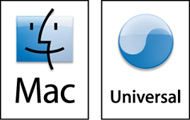Stub for Universal Binary Download Page
Draft page for revision to http://wiki.mozilla.org/Mac:Intel to advise end users of RC availability of Mac OS X Universal Binary of Firefox 1.5.0.2.
Download Firefox 1.5.0.2 Universal Binary Release Candidate
The Mac OS X Universal Binary Release Candidate (RC) for Mozilla Firefox 1.5.0.2 is available now. Help us test the quality of this release candidate by downloading and using the RC. Mozilla supports the enhancements to performance introduced by the new MacIntel chipsets. We're looking forward to your feedback on the new Universal Binary release candidate for Firefox.
Here's what you'll need to get started:
- Mac OS X 10.2.x or later
- Macintosh computer with an Intel x86 or PowerPC G3, G4, or G5 processor
- 128MB RAM (Recommended: 256 MB RAM or greater)
- 200MB free hard drive space
Download the Firefox 1.5.0.2 Universal Binary release candidate
Development Update
The Intel Mac work for Firefox, Thunderbird, and Camino is largely done. All fixes are checked in, and you can build for Intel Macs right out of CVS on the trunk, MOZILLA_1_8_BRANCH, and MOZILLA_1_8_0_BRANCH.
Prerelease Builds
A prerelease build of Firefox 1.5.0.2 is available as a universal binary. It contains all x86 and universal fixes and should be fully functional.
- Firefox prerelease build, equivalent to pre-1.5.0.2
Test builds of Thunderbird are available as universal binaries. These are current rolling builds produced by a tinderbox directly from CVS with no additional patches. They may be susceptible to a profile migration bug, bug 331511.
- Thunderbird test build, equivalent to pre-1.5.0.2
Official Builds
- Camino 1.0, released as a universal binary on 2006-02-14
Universal Binary Goals
We produce universal binaries by building PowerPC bits using gcc 3.3 and the 10.2.8 SDK, and merging them with Intel bits generated with gcc 4.0 and the 10.4u SDK. The differences in compilers and SDKs accounts for the need to run on PowerPC under versions of Mac OS X earlier than 10.3.9. The universal merge is handled by a script that runs “lipo” on executable code.
More information on the universal build process is available at Mac OS X Universal Binaries.

